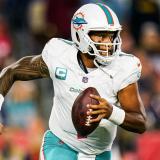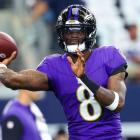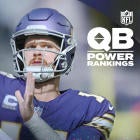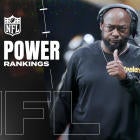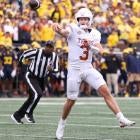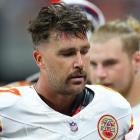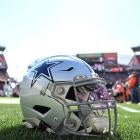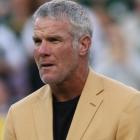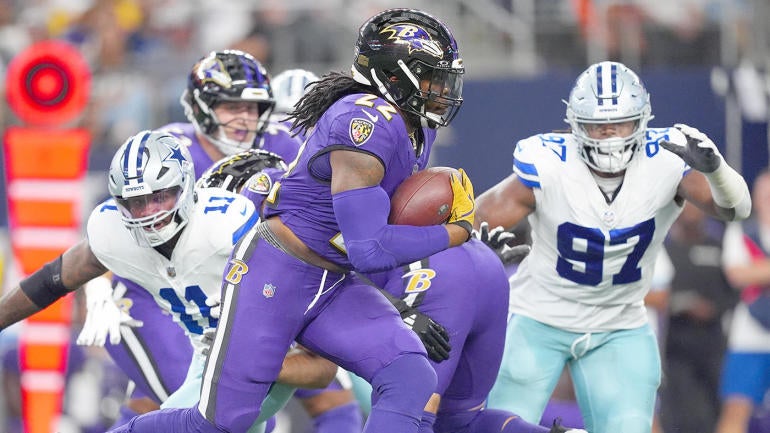
The Dallas Cowboys largely sat on the sidelines during the first wave of free agency when the major signings of players on the open market occur. The biggest splash Dallas made was signing 32-year-old linebacker Eric Kendricks to a one-year, $3 million contract worth a maximum of $3.5 million through incentives as a replacement for a retiring Leighton Vander Esch because he previously played under new defensive coordinator Mike Zimmer for several years with the Minnesota Vikings.
A glaring need at running back with Tony Pollard departing in free agency to the Tennessee Titans was initially addressed by re-signing Rico Dowdle to a one-year deal worth $1.255 million. Ezekiel Elliott, who was released in March 2023 with a post-June 1 designation, returned on a one-year, $2 million deal worth up to $3 million with incentives in late April after the 2024 NFL Draft.
Henry wanted to be a Cowboy
The Cowboys fumbled away a chance to significantly upgrade at running back. Derrick Henry, who was the NFL's second-leading rusher last season, wanted to play for Dallas. The 2020 NFL Offensive Player of the Year suggested playing for the Cowboys would have been the perfect situation because he lives in Dallas during the offseason. "I was like, man, if I'm not in Tennessee or I don't get to go to Dallas, I'd love to be a Raven," Henry said on the "Pivot" podcast in early April.
Henry signed a two-year, $16 million contract averaging $8 million per year with the Baltimore Ravens in March at the start of free agency. The deal has $9 million fully guaranteed and is worth as much as $20 million because of incentives.
The Cowboys never expressed any interest in signing Henry. "I thought it'd been some type of reach out, some type of talks or whatever," Henry said. "They never reached out, you know what I'm saying? ... They weren't really interested. It is what it is."
Henry got the last laugh on Sunday in Baltimore's win over Dallas. He ran for 151 yards and two touchdowns on 25 carries. Henry added another 23 yards on a reception to total 174 yards from scrimmage (combined rushing and receiving yards).
'We couldn't afford Derrick Henry,' but Dallas could have made it work
After the loss, Cowboys owner Jerry Jones was asked why he didn't sign Henry. "I like our personnel, Jones said. "We couldn't afford Derrick Henry."
The personnel Jones likes has been ineffective running the football. The Cowboys rank 30th in the NFL in rushing with 73.7 yards per game. Collectively, Dallas' running backs have 170 rushing yards and one touchdown on 49 attempts for 3.5 yards per carry this season.
The group doesn't fare any better under advanced metrics. According to the NFL's Next Gen Stats, the Cowboys are minus 74 rushing yards over expectation to only rank ahead of the Chicago Bears and Miami Dolphins.
By contrast, Henry's 281 rushing yards are fifth in the NFL. He is tied for the NFL lead with four rushing touchdowns. Henry is averaging 5.0 yards per carry. His 65 rushing yards over expectation are the NFL's fourth-best mark.
Jones is gaslighting the Cowboys fan base again over Henry. After proclaiming Dallas would be "all in" for the 2024 season, Jones dragged his feet on signing wide receiver CeeDee Lamb and quarterback Dak Prescott to contract extensions that ultimately freed up $9.251 million and $10,516,867 of 2024 salary cap room, respectively.
Getting either one of these deals done on the same time frame as the NFC East rival Philadelphia Eagles did when making Landon Dickerson the NFL's highest-paid offensive guard in March would have provided more than enough cap space to accommodate Henry. Baltimore's 2024 cap number for Henry is $5.105 million, consisting of a $7.79 million signing bonus prorated over the two contract years and a $1.21 million base salary.
Putting the delayed Lamb and Prescott signings aside, Dallas still could have worked through a tight salary cap situation to sign Henry. The same deal Henry got with the Ravens could have been done with a lower cap number.
That's because Dallas isn't a stranger to using dummy/voiding years in contracts. For example, 2025 and 2026 contract years automatically voiding on the 23rd day prior to the start of the 2025 league year (next Feb. 17) were added in a renegotiation of wide receiver Brandin Cooks' deal when he was acquired from the Houston Texans during the 2023 offseason.
Henry's 2024 cap number could have been as low as $2.768 million by adding three dummy/voiding contract years (2026, 2027 and 2028) to prorate Henry's $7.79 million signing bonus over five years instead of two years. A $2.768 million first-year cap number consisting of $1.558 million in signing bonus proration and a $1.21 million base salary would have only been $768,000 more than Elliott's $2 million cap figure for his one-year deal. This isn't even taking into account that Dallas has a separate $6.04 million 2024 cap charge relating to Elliott from releasing him last year with the post-June 1 designation.
There would be a $4.674 million cap charge in 2026 when the three fake years voided with Henry's signing bonus being prorated at $1.558 million annually on Dallas' salary cap for the five years. That's not much more than the $4 million cap charge the Cowboys will have next year for Cook's contract voiding.
It's conceivable that Henry may have been receptive to taking less money than with the Ravens to play for the Cowboys because of convenience and taxes. He wouldn't have had to relocate because of his Dallas residence. Texas is one of the few states where NFL teams are located that don't have a state income tax. Florida, Nevada, Tennessee and Washington are the others. Henry should have an appreciation for the lack of these taxes after spending the first eight years of his NFL career in Nashville with the Titans.
Maryland's top state income tax rate is 5.75%, according to Robert Raiola (@SportsTaxMan on X), who is the director of the Sports and Entertainment Group at PKF O'Connor Davies in the metropolitan New York area. Maryland also has a local income tax with a top rate of 3.2%.
I enlisted Raiola to provide his expertise in determining Henry's net wages from his Ravens contract and what the equivalent contract would be with the Cowboys. Henry's income from his Ravens contract after federal, state and payroll taxes is $8.3 million under Raiola's calculations. A two-year, $14 million contract with the Cowboys would give Henry the same net amount in Texas since there aren't state income taxes.
Henry is getting 56.25% of the $16 million from his Ravens contract in the first year. That would be $7.875 million on $14 million from the Cowboys. Henry's 2024 cap number would have been $4.575 million on a straight two-year deal with a $6.6 million signing bonus and a $1.275 million base salary. By adding three dummy/voiding years, Henry's 2024 cap number would have dropped to $2.595 million ($1.32 million in signing bonus proration and a $1.275 million base salary).
What Cowboys missed out on
Henry's presence on the Cowboys may not have changed the current 1-2 record because of a porous run defense. At a minimum, Henry would have brought more balance to a one-dimensional offense. He also would have added an element that was missing last season with Pollard. At 6-foot-3 and 247 pounds, Henry's rare size for a running back would have made it easier for the Cowboys to close out games on the ground. He could have been a major weapon in red zone situations around the goal line as well.
Nonetheless, it wouldn't have been too hard for Jones to gauge Henry's interest in taking the smaller contract to play for the Cowboys. He is already quite familiar with Henry's representation. Henry has the same agent as Prescott. We'll never know whether Henry would have been open to it or a bigger discount because the Cowboys didn't bother to try.







